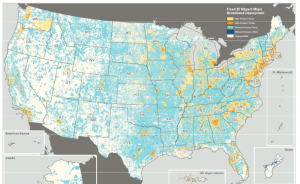I live in Carson City, which is neither urban nor rural.
It is more than a town and less than a city. We have most of the conveniences of an urban area, but not a lot of choices.
We can, of course, drive 20 minutes north to Reno. Or four hours west to San Francisco, or seven hours south to Las Vegas.
On the other hand, if we drive 20 minutes east, we’re on the outskirts of Stagecoach. Drive four hours in any other direction and we’ve pretty much left civilization behind.
All of which is a long way of saying that gigantic parts of Nevada lack modern conveniences such as access to the internet.
That was reinforced this week by the release of a Federal Communications Commission report noting that rural areas of America are ‘failing to keep pace’ with the deployment of modern technology.
Two-thirds of rural residents of Nevada don’t have access to broadband internet service.
Here’s the FCC’s map:
The blue spots are populated areas without broadband access. The white areas are unpopulated. (Here’s a link to the state report so you can see it better.)
Now, we all know Nevada’s population is concentrated in two areas — Reno and Las Vegas. So the vast majority of the state’s residents do, indeed, have access to the internet if they want it.
That’s great for them. What’s not so good is when some legislators try to insist that public notices should be shifted to the internet, rather than printed in newspapers, because newspapers are so old-fashioned.
My testimony on such legislation always begins with, ‘This is not about print vs. internet. It’s about print AND internet.’
The whole point of public notices is to expose as many people as possible to the information they need to see. It might be a city ordinance. It might be abandonment of parental rights. It might be the closing of a school. It might be a change in water rights.
People don’t generally go searching for that information. It has to be distributed to them.
To that end, newspapers have been doing the job under an established and effective system for more than a century. In recent years, though, we have recognized our responsibility and the changing times to make sure the print notices also get uploaded to the internet.
Most newspapers already publish the notices on their own sites. In almost every state, there also exists a statewide compilation of notices on sites operated by the press associations. In Nevada, we also place information on our main site as well as host a site, nevadapublicnotice.com, that serves as a landing spot for people who are trying to find notices.
We’ve put a lot of money and effort into making sure notices are available to the public as easily and effectively as possible. They are vitally important.
There are strong reasons — aside from the availability — public notices must be printed. They are a permanent record, which can’t be altered. They are archived (you can look up the notices on mining claims in Virginia City in the 1870s by going to the newspapers at the Nevada State Library and Archives). They are admissible, on their face, in court without the need of corroborating testimony. Newspapers provide affidavits of publication, attesting to their true and accurate form.
But when the argument in favor of internet publication is to make them more available — well, that simply doesn’t stand up. The result will always be less availability.
And when you’re talking about residents of rural Nevada, you may well be talking about no availability.
 Nevada Press Association The best in Nevada journalism since 1924
Nevada Press Association The best in Nevada journalism since 1924

Reblogged this on Nevada State Personnel Watch.
Look at Rhode Island – our population is just under a million yet the number without is 1% of total population. Not bad – we have Cox and Verizon here and the cell carriers like at&t, Sprint, T-Mobile (And MetroPCS which I use.). The latter two offer 4G Wifi services off their phones. Pretty cool.